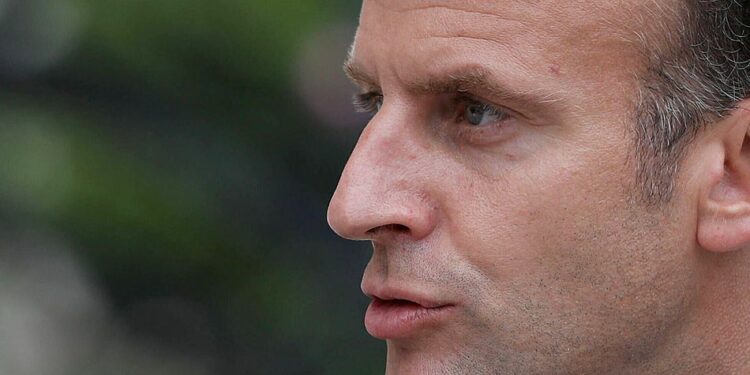Emmanuel Macron’s decision to call a snap election immediately after his party’s humiliating loss in the European parliament shocked international observers. It seemed counterintuitive for the French president to call people back to the polls when the far right had just scored the biggest electoral success in the Fifth Republic’s history. Marine Le Pen’s Rassemblement National, or National Rally, won 30 seats in Brussels; Macron’s centrist coalition won only 13.
But there may have been method to Macron’s madness. France’s president was probably going to have to call an election in the next year anyway. That decision rested on whether he could get a budget through the French legislature. The parliament has been fractious since Macron’s party, then called La République en Marche, lost its majority in 2022, in the legislative election directly after his re-election as president. Why let the narrative of the far right’s victory fester and build for all that time in between?
Macron seemed to be calling the French public’s bluff. EU citizens often use the European parliament elections as a channel for protest votes, registering discontent with their country’s ruling party. This is why opposition parties normally win the most seats there. Macron was betting that while French voters might be willing to support extremes in a distant parliament in Brussels that they don’t understand, they wouldn’t be willing to take the same risk in an election for their own national assembly.
Two weeks later, it doesn’t look like that calculation has paid off. The far-right National Rally is polling at 34 per cent, and Popular Front, a quickly assembled broad-left coalition dominated by the far left, is polling at 28 per cent. Meanwhile Macron’s party—now renamed the “Renaissance” party—is polling at just 20 per cent, only one point higher than before the EU vote.
French elections happen in two rounds. If no candidate receives 50 per cent of the vote in the first round, which almost never happens, there is a second, usually with the top two candidates. Any candidate receiving less than 12.5 per cent of votes is eliminated from that subsequent round, a threshold which Renaissance is falling below in many constituencies. The election increasingly looks like a battle between the far right and the far left for control of parliament, with the centre expected to come in third place. This is unprecedented in French history. As the election draws closer, it looks most likely that no party will have a majority. Finding a workable coalition could be near impossible. But things are moving rapidly, and anything could happen in the two rounds of voting on Sunday 30th June and 7th July.
The situation is dramatic, but not nearly as dramatic as it would be in a parliamentary democracy. Unlike the rest of Europe, France has a presidential system like the US. This legislative election will be like the US mid-terms—they do not determine the presidency, just the control of parliament. So even if the far right wins a majority of seats, and Le Pen protégé Jordan Bardella becomes prime minister (Le Pen is saving herself for the presidential election in 2027), that does not mean the same thing as, say, Giorgia Meloni becoming prime minister in Italy. It would be like a far-right politician becoming speaker of the House of Representatives in the US during the Biden presidency (which, you could argue, is indeed currently the case).
That being said, while the US has a full presidential system, France’s is technically only semi-presidential, with ministers coming from parliament rather than the executive. As a result of the way in which the country’s 1956 constitution was designed, the president-elect’s party usually also wins a majority in the parliament a few months later. This hasn’t always been the case, however. There have been three periods of “cohabitation”—when the parliament and the presidency were controlled by different parties—in France’s postwar history: 1986 to 1988, 1993 to 1995, and 1997 to 2002. All of these were between centre-left and centre-right parties. A cohabitation between a centrist and the extremes could prove far more complicated.
If Macron loses control of France’s parliament, it will still be his role to appoint the prime minister. That person must be able to survive a majority confidence vote of lawmakers, so it’s a bit like the British monarch appointing the prime minister—it’s not really their decision. Macron would still preside over the council of ministers, but those ministers would come from a parliament he doesn’t control. Macron would still be in charge of the military and foreign policy, but this could be challenged by his foreign minister. The president has the power to issue ordinances and decrees, but these can be challenged, too. Macron can also overrule parliament if he cites a “serious and immediate” threat to the nation, or to France’s international commitments.
In short, a far-right victory in the legislative election would be unprecedented and dramatic, but it would be much less dramatic than Donald Trump taking power in the US. It would also be less dramatic than Giorgia Meloni’s party, which is a four-steps-removed successor to Mussolini’s fascists, taking power in Italy two years ago. But given how unprecedented the situation is, and how central France is to Europe’s economy and security, this would move the continent into uncharted territory.
It could also indicate that it is only a matter of time before the far right takes control of the French executive, eventually holding a majority in the European Council. In America, far-right authoritarianism is on the doorstep, waiting for that door to open come November. In Europe, it is still just down the street—but it is approaching with the wind at its back.
Source link : https://www.prospectmagazine.co.uk/world/europe/france/67036/macrons-snap-election-misstep
Author :
Publish date : 2024-06-26 12:11:07
Copyright for syndicated content belongs to the linked Source.


